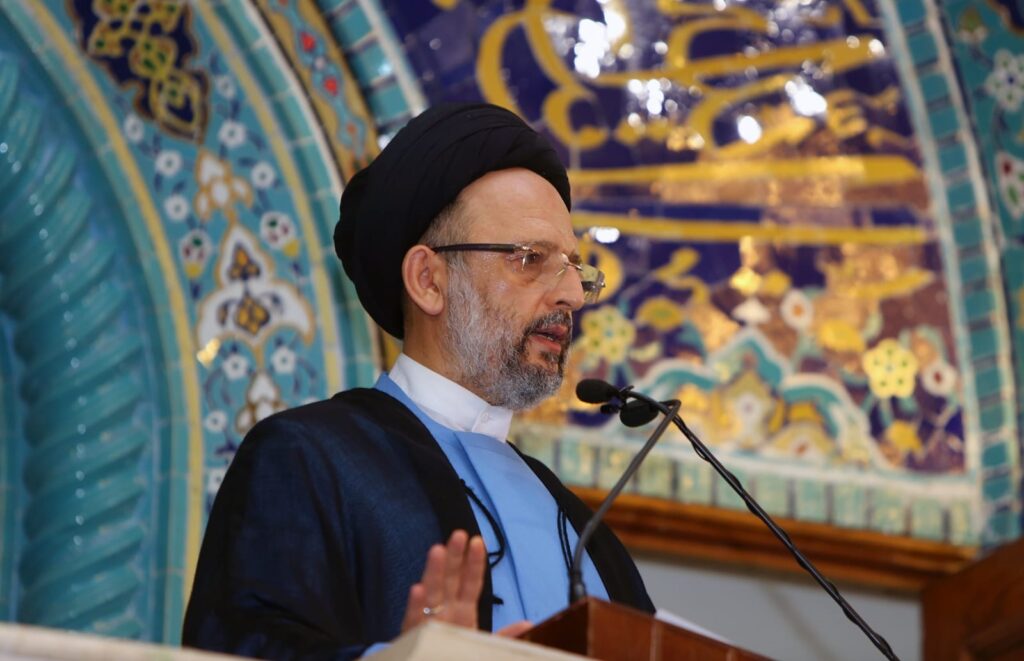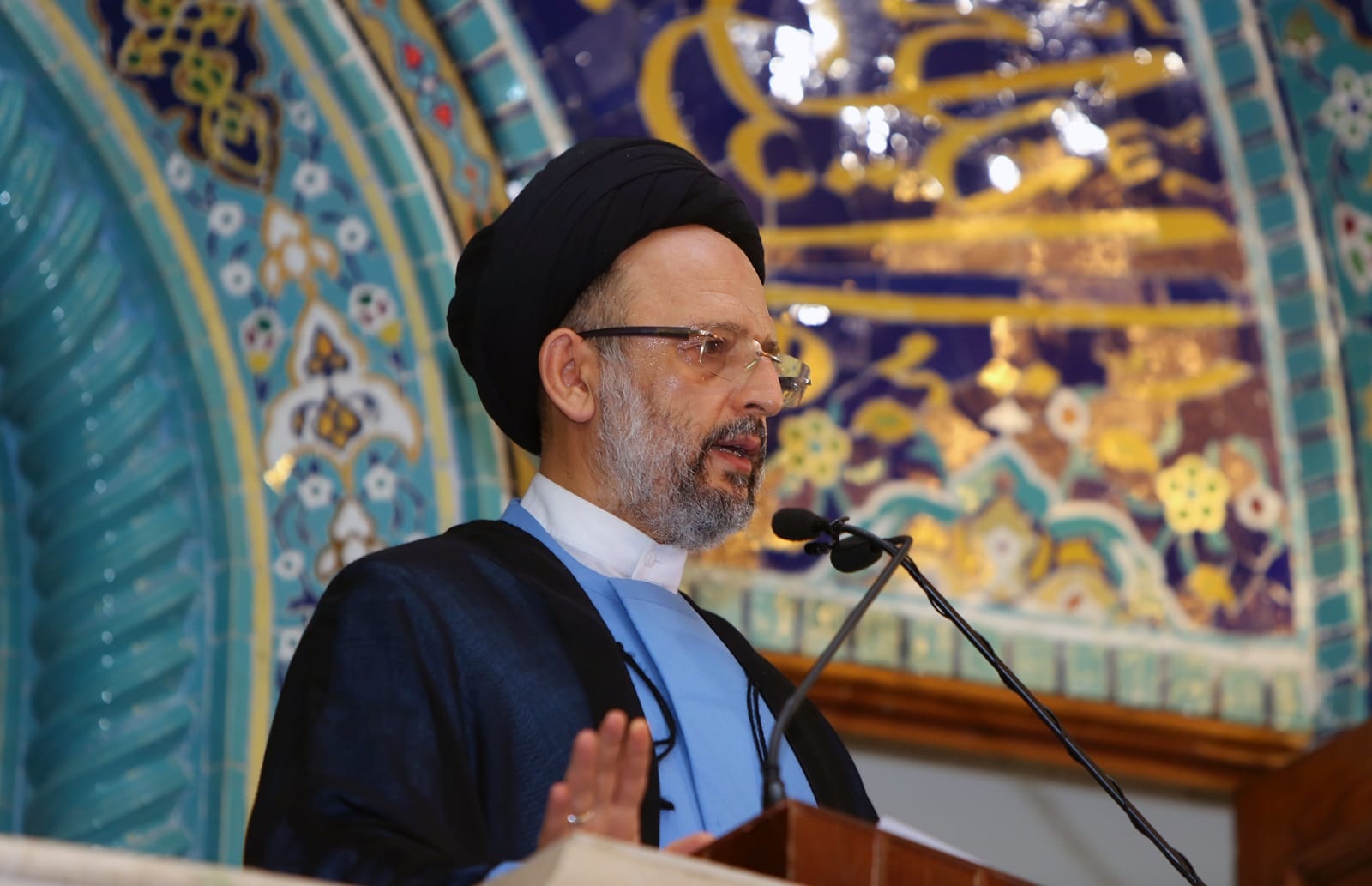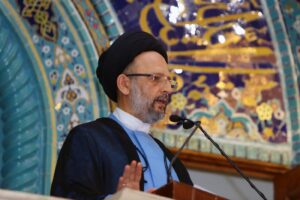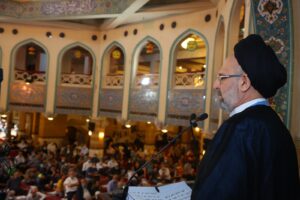In The Name of Allah, The Compassionate, The Merciful.
His Eminence, Sayyed Ali Fadlallah, delivered the two Friday prayer sermons at the Imamain Al-Hassanain Mosque, Shawal 24, 1445 /May 3, 2024. Several prominent religious scholars, dignitaries, and hundreds of believers attended the Jumu’a prayer. Following is a summary of the sermons.
The First Sermon
I do not ask you for any reward for it except the love of [my] relatives
Allah, the Most Exalted, says in His Glorious Book:
This is that which Allah gives glad tidings of to His servants who have believed and done righteous deeds. Say: “I do not ask you for any reward for it except the love of [my] relatives. Allah, the Most Exalted, speaks the Truth.
On the twenty-fifth of the month of Shawwal, we are on a date with a sad memory, which is the anniversary of the death of one of the Imams of the Ahlul Bayt (a.s.), whom Allah commanded us to love and considered it a form of gratitude for what the Messenger of Allah (p.) did and the efforts he made in conveying his message and the harm he was exposed to for its sake, and about whom the Messenger of Allah said: “I leave among you two things that if you hold fast to them, you will never go astray after me: the Book of Allah and my family, my Ahlul Bayt.” He is Imam Ja’far bin Muhammad al-Sadiq (a.s.).
This Imam, who was known for his knowledge, patience, worship, frequent remembrance of Allah, good character, generosity, and giving, and the characteristic associated with his name, “the Truthful,” indicated the virtue he possessed, which is truthfulness in words and deeds. He said: “Do not be deceived by their prayers and fasting, for a man may become so accustomed to prayer and fasting that if he leaves them, he feels lonely or isolated, but test them by their truthfulness in speech and the fulfillment of their trusts”
This Imam lived in the transitional period between the decline of Umayyad rule and the beginning of Abbasid rule, which gave him a degree of freedom that was not available to the rest of the Imams ,which contributed to the spread of the knowledge of the Ahlul Bayt, until their school of thought was associated with his name, so it is said the Ja’fari school of thought.
And his mosque, the Kufa Mosque, was a destination for students of knowledge who came to him from all parts of the Islamic world to study under him. They found with him vast knowledge and clear answers to the questions and doubts that were raised at that time in the Islamic arena. And in that, one of the narrators says: “I entered the Kufa Mosque, twenty years after the death of Imam al-Sadiq (a.s.), and I found nine hundred religious scholars, each one saying: Ja’far bin Muhammad told me.”
And the school of this Imam, as it was known, was distinguished by its openness, as it brought together all the jurisprudential, intellectual and theological diversities in the Islamic world… And it constituted a practical manifestation of Islamic unity, where those who differed with him in their school of thought did not hesitate to study under him and take from his knowledge, because they found in him deep knowledge of Islam and his respect for the opinions of others… So we find that Abu Hanifa al-Nu’man, Imam of the Hanafi school of thought, had no problem studying under Imam al-Sadiq and he went so far as to say: “If it were not for the two years ( he studied under the Imam), al-Nu’man would have perished.” Malik bin Anas, Imam of the Maliki school of thought, also studied under him, and he said: “No eye has seen, no ear has heard, and no one has crossed the mind of a human being better than Ja’far al-Sadiq in virtue, knowledge, worship and piety.”
And Imam al-Sadiq (a.s.) was characterized by his dialogue, so he dialogued with the Zoroastrians, atheists, extremists, Sufis and followers of heavenly religions. And everyone who dialogued with him bore witness to his good speech, his respect for the other opinion, his sound logic, and his rationality in his response. This was expressed by Ibn al-Muqaffa’, who was one of those who were influenced by the Zoroastrians: There is no one who deserves the name of humanity like Ja’far bin Muhammad.
Ibn al-Awja expressed his views, being one of the prominent atheists, to one of the Imam’s disciples when he became harsh in speech while discussing the existence of God: “If you are from the companions of Ja’far ibn Muhammad al-Sadiq, this is not how you should address us, nor should you argue with such evidence. He has heard more from our words than you have. But he was not rude in his speech, nor exceed limits in his response. Indeed, He is the forbearing, the discerning.”
Today, on the anniversary of the passing of this great Imam, we will reflect on the guidance he entrusted to us…
The first advice he wished to emphasize is that the relationship among believers should be built on thinking well of others. One should not interpret what comes from them, whether in word or deed, in a negative light; there might be potential for good in it. He said: “… And do not assume evil from every word that comes from your brother; while you will find it laden with goodness.” This aligns with the Quranic verse: “O you who have believed, avoid much [negative] assumption. Indeed, some assumption is sin.” …
Regarding his counsel on interacting with followers of other sects and religions, he said: “Maintain ties with their families, attend their funerals, visit their sick, and fulfill their rights. For when a person among you is religious, truthful in speech, fulfills trusts, and has good manners with people, it is said: This person is of the followers of Ja’far. This pleases me and brings me joy. But if not, their affliction and disgrace enter upon me… Be advocates for people with other than your tongues, so they may see in you piety, diligence, prayer, and goodness. For that is the true invitation.” “O Shia of the House of Muhammad, fear Allah as much as you can, for there is no power or strength except with Allah.”
Our allegiance to this Imam does not stop at mere affiliation, invocation, or visitation. It also involves adopting his ethics, the value of truth in his life, and following his guidance left as a legacy for us. In his dialogical approach, he reached hearts and minds, extending bridges of communication with others, which we are in dire need of, and by which we emulate and follow him…
Therefore, we ask Allah to help us adhere to this path, the path of authentic Islam, to be sincere in our words and actions, and to be sheltered under his banner, so we may benefit from his intercession and the honor of being close to him in the position that Allah will honor him with.
The second sermon
Worshippers of Allah, I advise you and advise myself with Imam Ja’far al-Sadiq’s (a.s.) advice: “Increase your supplications, for Allah loves those of His servants who supplicate to Him. He has promised His believing servants a response, and Allah will turn the supplications of the believers in their favor on the Day of Resurrection, as a deed that will increase their reward in Paradise. And remember Allah as much as you can, every hour of the day and night, for Allah has commanded you to remember Him frequently, and Allah remembers those who remember Him among the believers. Maintain your prayers and the middle prayer, and stand before Allah obediently, as Allah has commanded the believers in His Book before you. Beware of transgressing against one another, for this is not a characteristic of the righteous. Whoever transgresses makes Allah’s wrath turn against himself, and Allah’s support will be for the one who is transgressed against. Beware of envy, for disbelief stems from envy. Beware of desiring what Allah has forbidden for you, for whoever violates what Allah has forbidden for him in this world, Allah will set a barrier between him and Paradise, with all its delights and pleasures.”
Beloved ones, we are in dire need of these instructions to guide us, to make them our provision in this world and our path in the Hereafter. Through them, we express our love and allegiance to this Imam, and we become more aware, responsible, and capable of facing challenges.
The beginning is from Gaza, where the enemy continues to sink in its sands, unable to achieve any of its goals despite more than two hundred days since the beginning of its war.
This enemy has gambled, since the beginning of the battle, on breaking the will of the Palestinian people by pursuing a policy of killing and destruction against them, hoping to force them to relinquish their legitimate rights. However, they were surprised by the steadfastness and resilience of this people, who, despite the wounds, pain, and destruction, did not surrender or falter…
The enemy is bewildered, as the battle has been shifted into its own territory. Its military and security leaders have expressed their failure to manage the battle, unable to achieve a decisive victory. Resignations have occurred recently, and it seems they will continue, along with increasing popular protests, which have become a pressure on the enemy’s leaders and war council.
The supporting countries of this entity find themselves constrained, as it has proven incapable of achieving the declared objectives despite the ample opportunities, resources, and support provided to it. The enemy is now facing condemnation from the world, even to the extent of lawsuits filed against it. The International Court is considering trials against the enemy’s leaders, prompting them to seek intervention from the United States to pressure the court to prevent judgments against them…
At this time, negotiations continue, through which the entity seeks to achieve what it failed to achieve on the battlefield, without showing any readiness to give the Palestinian people their right to stop the bloodshed, destruction, and voluntary return to their land, and to lift the siege imposed on them…
We find ourselves in the midst of ongoing events, appreciating all those who stand with this people today, through condemnations of this enemy or through marches and student sit-ins in many American universities, which are the main supporters of this entity, extending to France and Britain, despite repression, arrests, expulsions from universities, and defamation faced by students in their activism, which constitutes condemnation of this entity and the countries claiming commitment to freedom but condemning those who oppose it…
At this time, we renew our call to Palestinian factions to respond to all calls working to unite the Palestinian ranks to confront the challenge facing this people from the enemy entity, which seeks to undermine the entire Palestinian cause, without distinguishing between one Palestinian faction and another.
Turning to Lebanon, where the Resistance continues to play its role in supporting the Palestinian people and maintaining the borders, responding to its attacks on the basis of “an eye for an eye” and preventing it from achieving its goals that affect Lebanese sovereignty, applying a policy of deterrence against it, ensuring that it will not be a picnic if it wages a wide-scale war on Lebanon.
At this time, the international envoys’ movement continues, with the latest being the French Foreign Minister’s visit. While we welcome any initiative seeking to help Lebanon and stop the war against it, unfortunately, we still see that the envoys’ movement continues to consider getting the enemy out of its predicament by stopping the battles on the Palestinian-Lebanese borders and returning its settlers without considering the suffering of the Lebanese people from this enemy or taking into account the reasons that led the resistance to open this front and the role it plays, which calls for serious addressing of the concerns and sufferings of the Lebanese and not just focusing on the concerns of the enemy.
In this regard, we emphasize the importance of the unified Lebanese stance in confronting this enemy and dealing with all proposals brought by the envoys from abroad…
Regarding the Syrian displacement issue, it requires serious addressing due to the repercussions it leaves on various levels, not just on the financial aspect as done by the European Union, tempting the Lebanese, but addressing its causes and organizing this presence to avoid any repercussions on the internal situation and the concerns arising from it, fearing its exacerbation, which would affect the relationship between the Lebanese and the Syrian refugees.
We remain concerned about the recent attacks on minors, indicating the extent of the danger threatening the Lebanese society morally, necessitating vigilance from parents, educators, and religious and social workers to confront the spread of this phenomenon. The state must bear its heavy responsibilities to safeguard the social security of this country and the safety of its children…





